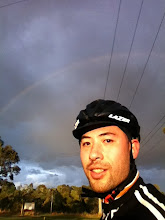I didn't just wake up one day and decide to do an Ironman. My journey to that decision was a more subtle and slow evolution that began in my late twenties. I was your stereotypical office worker. A few kilos overweight, mainly sedentary, drinking a lot and smoking too. I felt heavy, slow and uncomfortable. One day I realised that I had man boobs and my disgust at the state of my body was the initial spark that led to the burning passion that I now have for endurance sports. I began to focus on getting myself healthy, losing weight, getting active, and starting to participate in a more active lifestyle. I initially focused on getting fitter, but as I got faster and stronger, I began to set more lofty goals for myself. It was hard work, I lost my way several times, but I feel that I'm on the right track to achieve my eventual goal of becoming an Ironman.
The 2013 Melbourne Ironman event recently sold out completely in five minutes. This is a striking demonstration of the growing popularity of endurance sports, all the more surprising because the bulk of the entrants are "middle-aged" people in their thirties and forties. A very high percentage of these entrants are drawn from the ranks of the professional world. Accountants, lawyers, doctors and other corporate high flyers are flocking to endurance events in unprecedented numbers.
But why are we seeing so many professionals, long regarded as desk bound softies, putting themselves through the intense preparation required to race these extreme events? I have a theory that it comes down to our basic, primal need to compete. To test ones strength and endurance against that of others, or in most cases in Triathlon and other endurance events, against oneself. I think that most of the people that I race against probably have that same voice in their head asking "Are you tough enough?". The ability to answer that most basic of internal questions is what drives me to train hard, put myself through pain, early mornings and long hours on the road. When people ask me why, I usually just answer "because I want to know if I can".
I'm often accused of being overly competitive, and truth be told, it's probably true. I like winning, and I can't stand not being good at something. When it comes to Triathlon however, or even long distance running, I don't really care where I place, as long as I know that I gave 100% the entire race. I'm usually more concerned with beating a previous best time, than with trying to get on the podium (which realistically is never going to happen).












I love how they say it sold out in four minutes...
ReplyDeleteMy friend got a spot 15 minutes after enties opened, you just have to be persistent because people open registrations they have no intention completing to make sure their friends get in. It's retarded.
Anyway.
I agree with you about Ironman. I don't know what I'd do without my long training days sometimes.
I haven't gone long yet, but I feel it's not far off. See how I feel after my 3rd 70.3 of the season this weekend :)
Triathlon is the new golf!!
I believe training for Ironmans keep us sain. The satisfaction we feel after a long trainings day is enourmous. Accomplished again I'd say. The training towards the event is huge and the IM itself is one of the best days of my life. I felt so strong afterwards and feel I can DO anything now. Ironman Austria done last year, this year it will be Tremblant.
ReplyDeleteBesides the physical strenght we gain from it - it is a total mind game, if you win that mind game you are ahead of the game. Good luck to everybody in training. YOU can DO IT!!!!!